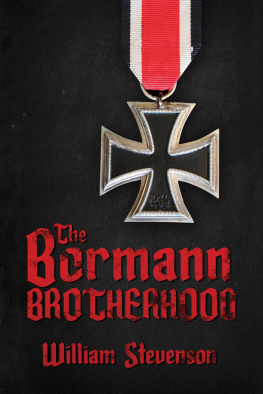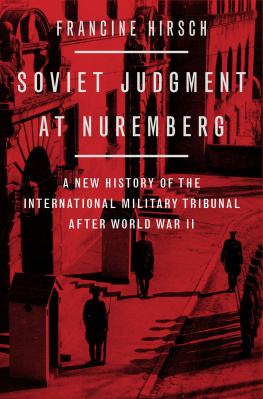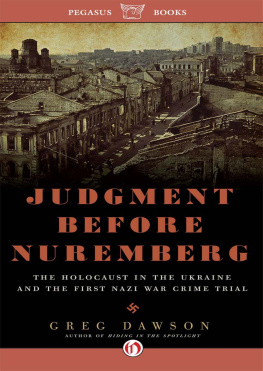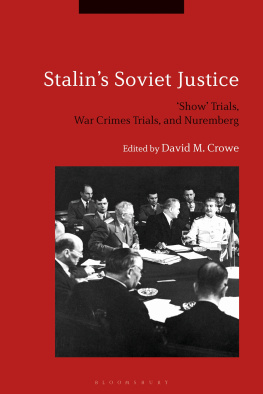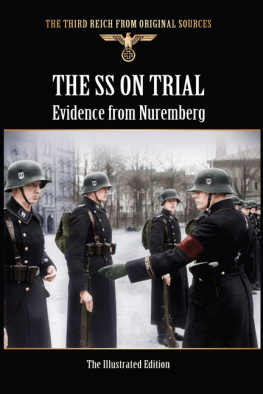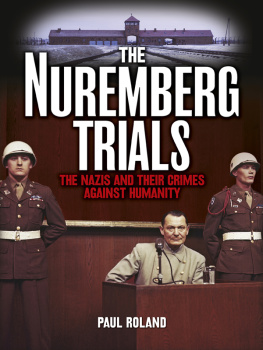
A SHATTERING CHRONICLE!
Based upon independent investigation, numerous exclusive interviews and recently declassified documents revealing in their implications.
THE BORMANN BROTHERHOOD
William Stevenson, holder of the Canadian National Press Award, has covered every major conflict since Korea. He is the author of seven books, writer of television documentaries and possibly the worlds most traveled journalist. It was in the course of these travels that he encountered the elusive pieces of the Nazi puzzlenow brilliantly and convincingly joined in this timely and important book.


Copyright 1973 by William Stevenson
First Skyhorse edition 2019
Originally published by Harcourt Brace Jovanovich in 1973.
Published by Bantam Books in 1974.
All rights reserved. No part of this book may be reproduced in any manner without the express written consent of the publisher, except in the case of brief excerpts in critical reviews or articles. All inquiries should be addressed to Skyhorse Publishing, 307 West 36th Street, 11th Floor, New York, NY 10018.
Skyhorse Publishing books may be purchased in bulk at special discounts for sales promotion, corporate gifts, fund-raising, or educational purposes. Special editions can also be created to specifications. For details, contact the Special Sales Department, Skyhorse Publishing, 307 West 36th Street, 11th Floor, New York, NY 10018 or .
Skyhorse and Skyhorse Publishing are registered trademarks of Skyhorse Publishing, Inc., a Delaware corporation.
Visit our website at www.skyhorsepublishing.com.
10 9 8 7 6 5 4 3 2 1
Library of Congress Cataloging-in-Publication Data is available on file.
Cover design by Rain Saukas
Print ISBN: 978-1-5107-2916-2
Ebook ISBN: 978-1-5107-2919-3
Printed in the United States o f America
For
INTREPID
CONTENTS
ACKNOWLEDGMENTS AND
A NOTE ON SOURCES
FOREWORD TO THE SKYHORSE EDITION
BY DICK RUSSELL
ACKNOWLEDGMENTS AND A NOTE ON SOURCES
Martin Bormann did all he could to prevent information about himself from reaching his enemies. War criminals sank into a similar anonymity. Their postwar movements were followed by Allied joint intelligence teams, and their findings, particularly in the case of Bormann, became a primary source of information. Some of this material is available in the National Archives, Washington, D.C., and is classified as privileged. Similar material was declassified by the British in 1972 and can be traced through the Public Record Office. However, the hunt for Bormann and his Nazi brothers continued into the period still covered by countries various official secrecy acts. A report involving espionage and secret-police operations is bedeviled by difficulties of this sort. Some sources cannot be plainly identified; some informants risk the vengeance of Nazi self-protection gangs.
I have mentioned in the text those authorities who can be identified; I am, of course, most grateful for their help. Listed here are some of the individuals to whom I am also indebted. I have added the names of those libraries from which came most of my background information and many of my leads. The mention of film libraries as well may seem a trifle eccentric. In the case of an elusive personality like Bormann, I found a new method in use among investigative agencies utilizing old newsreels. These conveyed in an uncanny fashion the mans true dimensions. I would like to thank the film archivists who helped catch Bormann flitting through old and scratched film. He was examined frame by frame until we became familiar with small gestures and other mannerisms which he would have difficulty changing.
It is the practice in any historical survey of this kind to support certain assertions with detailed references to the writers authorities. I have quoted from documents which at the time they were written were secret and confidential. Time changed their grading. To avoid embarrassment, however, I have not referred to documents that are not yet open to public inspection in the United States and Britain, although I have seen parallel documents in European archives, where their authenticity is beyond doubt.
In the case of individual accounts, Thucydides said it all when he commented upon the difficulty of chronicling the Peloponnesian War. The stories of battle commanders did not tally with the facts. General impressions were misleading. Eyewitnesses had to be double-checked because many suffered either from partiality for one side or the other or else from imperfect memories. So far as I have been able, I have taken into account here the imperfections and fallibilities of human memory. Most direct quotations come from transcripts of tape recordings or from shorthand notes.
The full verbatim account of the Nuremberg trials provided much information on Bormann and those who escaped through his foresight. Rather than refer to the many sources now available, which would tend to bewilder anyone pursuing this investigation further, I suggest consulting the twenty-three volumes of reports on the trials published by Her Majestys Stationery Office. It also confuses the issue to refer to the numbered Nuremberg trials documents, because not all were put in evidence; and of those put in evidence, not all were accepted by the court; but a tendency exists to regard any such documents as established evidence.
The long bibliographies that were a feature of books on the Nazi period tend nowadays to overlap to such an extent that it seemed more practical to refer to recent publications covering most of the existing literature. The opening of British Foreign Office files covering the war years and the relaxation of secrecy restrictions on certain Allied intelligence operations have also made clear inconsistencies and contradictions in earlier reports. This has been particularly true of Bormann himself, whose monstrous influence has become apparent only in more recent times.
The help given to me varied, naturally, because some individuals and libraries had more material to offer than others. Lord Russell of Liverpool, who was legal adviser to the British Commander in Chief in occupied Germany in the early postwar years, does deserve special mention because he was for a long time a voice crying in the wilderness. His experiences during the war-crimes trials led him to write The Scourge of the Swastika, and by the end of the 1960s he was disturbed enough to obtain the full text of the neo-Nazi National Democratic party manifesto and to gather the records of Nazi war criminals who, by one device or another, had cheated justice.
The late chief of the U.S. Office of Strategic Services, General William J. Donovan, left personal notes, which some of his friends and former agents have been kind enough to let me see, believing that he would have wanted this. The wartime chiefs of American and British secret agencies contributed personal accounts that had a bearing on the preparations for escape undertaken by thousands of leading Nazi figures in the midst of Germanys military campaigns.
Some German sources might prefer not to be acknowledged. I gained useful insight into the mentality of Hitlers military commanders from a book published in 1941 by a general staff officer of the First Panzer Division, called
Next page
